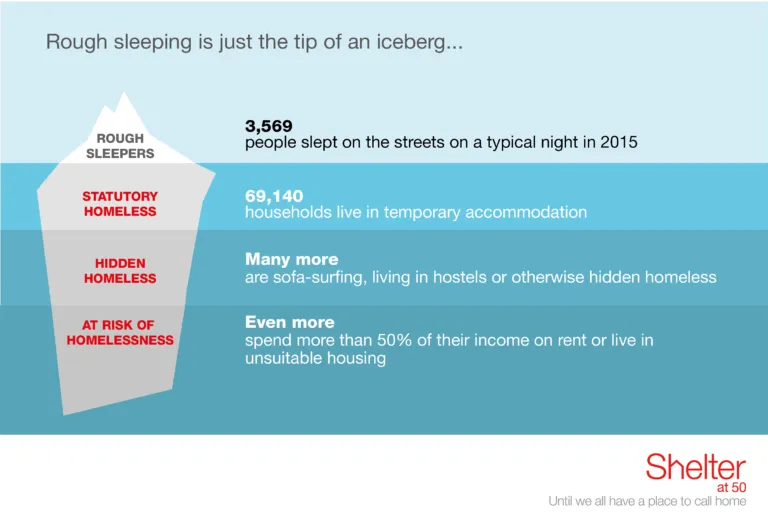The true scale of homelessness
Published: by Toby Lloyd
A version of this blog first appeared on Inside Housing immediately after the budget last week.
On the face of it, last week’s budget was promising news for homelessness. £115m has been pledged to help tackle rough sleeping – arguably the worst and most visible manifestation of our housing crisis. Today’s move by the government to try and stem the devastating and avoidable rise in homelessness is a welcome step. But it’s also long overdue considering the scale of the problem.
Firstly, while rough sleeping may be the most visible form of homelessness, it is just the tip of an iceberg. Hidden below the surface, many more homeless households are hidden away in temporary accommodation – including B&B rooms and dingy hostels. These households are classed as statutory homelessness, and councils have a legal duty to rehouse them.
Homelessness is the most tangible outcome of a dysfunctional housing market. For example, the loss of a home in the private rented sector is by far and away the biggest cause of homelessness, and has dramatically increased in recent years. Papering over the cracks just won’t do. We need deep rooted solutions to the housing crisis, alongside real money to tackle specific issues like rough sleeping.

And these numbers are rising at an alarming rate: the latest official figures, published today, show that:
-
In 2015, 41,020 families were accepted as homeless by their local council, an 8% rise in a year and 42% higher than five years ago.
-
The overall number of households accepted as homeless by their local council was 56,500 in 2015, 33% higher than five years ago.
-
The number of homeless families living in emergency B&B’s and hostels has risen by 14% in a year, up 103% in five years.
-
The loss of a private tenancy remains the single biggest cause of homelessness, with over 17,000 households becoming homeless after an eviction from a privately rented home in 2015, three times as many households as five years ago.
These figures are worrying enough – and we don’t even know how many more people are struggling but aren’t eligible for rehousing by their local authority. There aren’t proper stats that capture the true scale of ‘hidden homelessness’ – people sleeping on friends’ sofas, or being housed by social care services. Nor are their official stats on how many people are threatened with homelessness, for example struggling to pay their rent or living in dangerous conditions. But we know from the people we help that this is far too common – and government solutions aren’t helping ordinary people to house themselves affordably and securely.
So while we welcome the extra funding to assist rough sleepers, the government must not forget the broader challenge of homelessness – especially families with children living in temporary accommodation.
Secondly, it is wrong for the Chancellor to talk of this funding as a top-up for councils, because central government has been slowly reducing the money it gives to councils. In fact, by 2020 core government funding to councils will be phased out entirely. Instead the vast majority of council funding will come from their own business and council tax collections. This makes today’s news that business rates will be slashed of particular concern.
In order just to maintain spending on homelessness prevention, councils will have to resist other pressures and spend a higher proportion of their own funding pot on it, with diminishing support from government. If councils don’t expand the proportion that they’re spending on homelessness prevention these services could lose out on £31.4m of funding. So any extra cash that the Chancellor forks out must be offset against this possible loss to overall homelessness prevention funding.
Ultimately, we need to stem the rising tide of homelessness by using sustainable solutions. Every day at Shelter we see that homelessness – of any kind – is caused by decades of failure to build enough genuinely affordable homes and short-sighted welfare cuts. If the Chancellor is really serious about changing things, he needs to make building homes that people can actually afford his first priority.